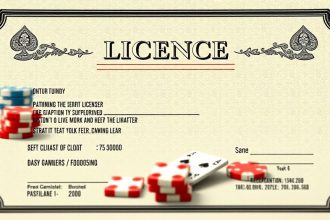New Zealand’s online casino market underwent significant reform in 2025 with the introduction of the Online Casino Gambling Bill on June 30, establishing a regulated licensing system for the first time. Administered by the Department of Internal Affairs (DIA), the regime aims to curb offshore gambling’s $300 million annual outflow while generating revenue through taxes. By October 2025, the government plans to auction 15 licenses, effective from early 2026, marking a shift from the Gambling Act 2003’s prohibition on domestic online casinos, which previously drove players to unregulated offshore sites.
Licensing Process and Criteria
The bill outlines a competitive auction for 15 exclusive online casino licenses, each valid for three years with renewal options. Operators must demonstrate:
- Financial Stability: Minimum capital of NZ$5 million and audited financials to ensure solvency.
- Technical Compliance: RNG certification from approved labs (e.g., eCOGRA) for all games, with RTP minimums of 85% for slots and 95% for table games. Platforms must support NZD transactions and integrate secure payment gateways like POLi.
- Responsible Gambling Measures: Mandatory tools including deposit limits (NZ$500 daily default), self-exclusion registers linked to DIA’s database, and AI-based risk detection for problem gambling, affecting 2% of players per DIA data.
- AML/KYC Protocols: Enhanced due diligence with ID verification via RealMe, and transaction monitoring to flag suspicious activity over NZ$10,000.
- Tax Obligations: 15% duty on gross gambling revenue (GGR), projected to yield NZ$200 million annually for harm minimization programs.
Applicants undergo DIA vetting, with foreign operators requiring local partnerships. Successful bidders pay a one-time fee of NZ$1-2 million, based on auction results.
Operational Standards
Licensed casinos must operate exclusively for New Zealand residents, geoblocking international access. Key requirements include:
- Game Offerings: Slots, table games (blackjack, roulette), and live dealer options from providers like Evolution Gaming, with no sports betting crossover unless separately licensed.
- Payment Limits: Deposits capped at NZ$2,000 weekly for non-VIP users; withdrawals processed within 48 hours, minimum NZ$20.
- Advertising Rules: Prohibited on TV/radio during peak hours; no celebrity endorsements or bonuses exceeding 100% match up to NZ$200. Social media ads must include harm warnings.
- Data Security: Compliance with Privacy Act 2020, using AES-256 encryption and annual cybersecurity audits.
By mid-2025, DIA had pre-qualified 25 applicants, including global firms like Bet365 and local entities partnered with offshore tech.
Market Impact and Revenue Projections
The regime targets a regulated market size of NZ$800 million by 2027, reducing offshore reliance (currently 90% of online play). Operators face a 12% GGR tax plus licensing fees, funding DIA’s enforcement. Player protections extend to mandatory cooling-off periods after losses exceeding NZ$1,000 weekly. Early data shows 40% of offshore users migrating to licensed sites post-launch simulation.
Enforcement and Challenges
DIA enforces via IP blocking for unlicensed sites, with fines up to NZ$500,000 for violations. Challenges include sports sector opposition, fearing revenue loss from pokie trusts (NZ$300 million annually to community sports), and potential black market persistence. Advertising risks prompted amendments in September 2025, tightening bonus promotions.
New Zealand’s licensing regime prioritizes harm reduction over expansion, capping licenses at 15. Players should verify DIA registration via the official directory for secure play, ensuring compliance with local standards in 2025’s evolving market.








